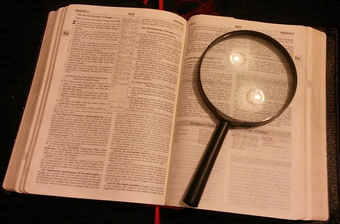CURRENT AFFAIRS
The Bible and the Transgender Restroom Issue
By Adam Davis

The Bible does indeed address the core issue of what is involved in legislation that seeks to provide "rights" for people who self-identify as gay, lesbian, or transgender. The idea such legislation effectively endorses is that the individual person is the one who decides what their sexual and gender behavior should be. The Bible says that God is the One who decides how humans are to behave sexually and within the scope of their gender. These two views could not be more diametrically opposed.
The Bible provides substantial texts that demonstrate God ordaining the sexual and gender behavior of the people created in His image. Genesis 1:27-28 says that God created people as either distinctly male or distinctly female. It should be carefully noted that God did not create people and then let them decide what they would be. Gender is an "or" proposition, not a "both/and" proposition. Psalm 139:13 (referring to God) declares "...you knit me together in my mother's womb..."Deuteronomy 22:5 says, "A woman must not wear men's clothing, nor a man wear women's clothing, for the Lord your God detests anyone who does this." These are just a few of the Scriptures that speak against the idea that man should decide his gender and role within his gender. The entire Biblical context is that of men and women each operating within the biology given to them by the one true God who created all things.
All people have a proclivity to sin of some kind. Maybe that sinful proclivity is theft, lying, or idolatry. The sin is not the temptation; it is the indulgence of the temptation into mental and/or physical manifestation. Simply because a person has inclinations to act like the opposite gender does not give that person license to indulge the behavior. A person may be inclined to covet the material things of their neighbor ("keeping up with the Joneses") but the Christian understands this unchecked desire to be the sin of coveting. The inclination to accumulate material things is not the sin per se, it is the actualization.
Sin is when one actualizes their own desires that are contrary to God's desires; such actions are the equivalent to saying "God, I know better than you do. I am my own god." This is exactly what occurs when a person says they really are a different gender than their biology indicates. Such was the state of the first sin of man (Genesis 3:1-14), where Adam and Eve acted upon their desires be like God.
One could also argue from natural law that transgenderism is wrong, but leave that aside for now. How a person understands pro-LGBT legislation will ultimately depend on what they think of the Bible. If a person genuinely believes that the Bible is the Word of God, then the moral and ethical commands contained within it cannot be parsed over like a buffet, taking what one likes and leaving what one doesn't like. God's revelation to man is a reflection of the very nature of the Creator Himself. Therefore, to think one knows better than God does about how to use the bodies He created is a slap in God's face.
Only with a non-Christian worldview is it even conceivable that a one should choose what gender they are, and hence what public bathroom they can use. Only by denying God's sovereignty and creative decree can one think that God made a mistake in their gender. And it is only by denying the Bible itself that one can think God has not been crystal clear in how to think about these important issues of our day.
There are several ways one could respond to the issue of the LGBT movement. First, the Bible says "you shall love your neighbor as yourself" (Deuteronomy 6:5, Luke 10:37). Of course, loving somebody does not mean agreeing with or condoning sin. It means one should act with kindness and grace at all times in willing the good of another person. This means dialogue should be held respectfully, with a genuine listening ear. It must also be made clear that disagreement is not hatred.
It should also be clear that once a person invokes "rights" (as in "I have a right to do X"), that person is invoking an objective grounding for rights which the Christian correctly understands as God. The right to one's life or property does not come from man. If such rights came from man they would be subject to constant change. If a person does not think rights are subject to constant change, then they are appealing to an objective source of those rights. Hence, the ultimate starting point for a substantive conversation on any LGBT issue is God. It is impossible to remove God from the conversation, because rights are invoked and because all laws are ultimately based on morality, and the source of objective morality is God.
The great news in this whole sea change of culture is that God loves beyond measure and pours out His mercy when none is even remotely warranted. That God would condescend and reveal Himself in Holy Scripture is just an element of His infinite grace. The Bible should then be the starting point for any consideration of the North Carolina law situation or other issues and dialogue. But the absolute best response to the LGBT issue is simply the unvarnished Gospel of Jesus Christ: "For our sake He made Him to be sin who knew no sin, so that in Him we might become the righteousness of God" (2 Corinthians 5:21).
Image Credit: JamesNichols; ; Creative Commons
Tags: Biblical-Truth | Christian-Life | Controversial-Issues | Current-Issues | God-Father | Political-Issues | Sin-Evil
comments powered by Disqus
Published 4-25-16

